
How to Feed the Fat After BBL?
Following BBL surgery proper nutrition becomes essential for optimal results. &8220;How to Feed the Fat After...
How to Feed the Fat After BBL?
Following BBL surgery proper nutrition becomes essential for optimal results. &8220;How to Feed the Fat After...
Following BBL surgery, proper nutrition becomes essential for optimal results. How to Feed the Fat After BBL is a critical consideration that many patients overlook. We recommend consuming at least 2000 nutrient-rich calories daily to maximize fat graft survival, though individual needs may vary.
Focus on high-protein sources (chicken, fish, legumes) for tissue repair, and incorporate healthy fats (avocados, nuts, olive oil) to nourish transferred fat cells. Stay well-hydrated while avoiding processed foods, refined sugars, and alcohol that trigger inflammation.
A strategic meal plan featuring smaller, frequent meals can help maintain steady nutrient intake, especially if your appetite fluctuates during recovery. Proper nutritional support can significantly improve your long-term results.
Considering a BBL? For a FREE personalized consultation, contact Alluring Plastic Surgery today at (786) 305-8649 or fill out our online contact form to schedule your consultation today.
Why Is Post-BBL Nutrition So Important?
After a Brazilian Butt Lift, the survival of transferred fat cells isn't guaranteed. Without proper post-operative care, including focused nutrition, your body may fail to retain much of the fat, leading to disappointing results.
Poor dietary habits can trigger inflammation, dehydration, and impaired circulation—all of which jeopardize the fat graft's viability. You’ve invested in your procedure; without strategic aftercare, that investment is at risk.
Many patients resume low-calorie diets or skip meals to “stay fit” after surgery, not realizing that caloric restriction starves the fat cells that were just grafted. The result? Fat loss, asymmetry, and sometimes the need for revision surgery.
Understanding what your body needs during recovery can make the difference between lasting enhancement and underwhelming results.
How Does Nutrition Support Fat Transfer After BBL?
When your body undergoes a Brazilian Butt Lift procedure, it initiates a complex biological process that requires considerable nutritional support to optimize results.
During fat transfer procedures, only 20–40% of transplanted cells survive
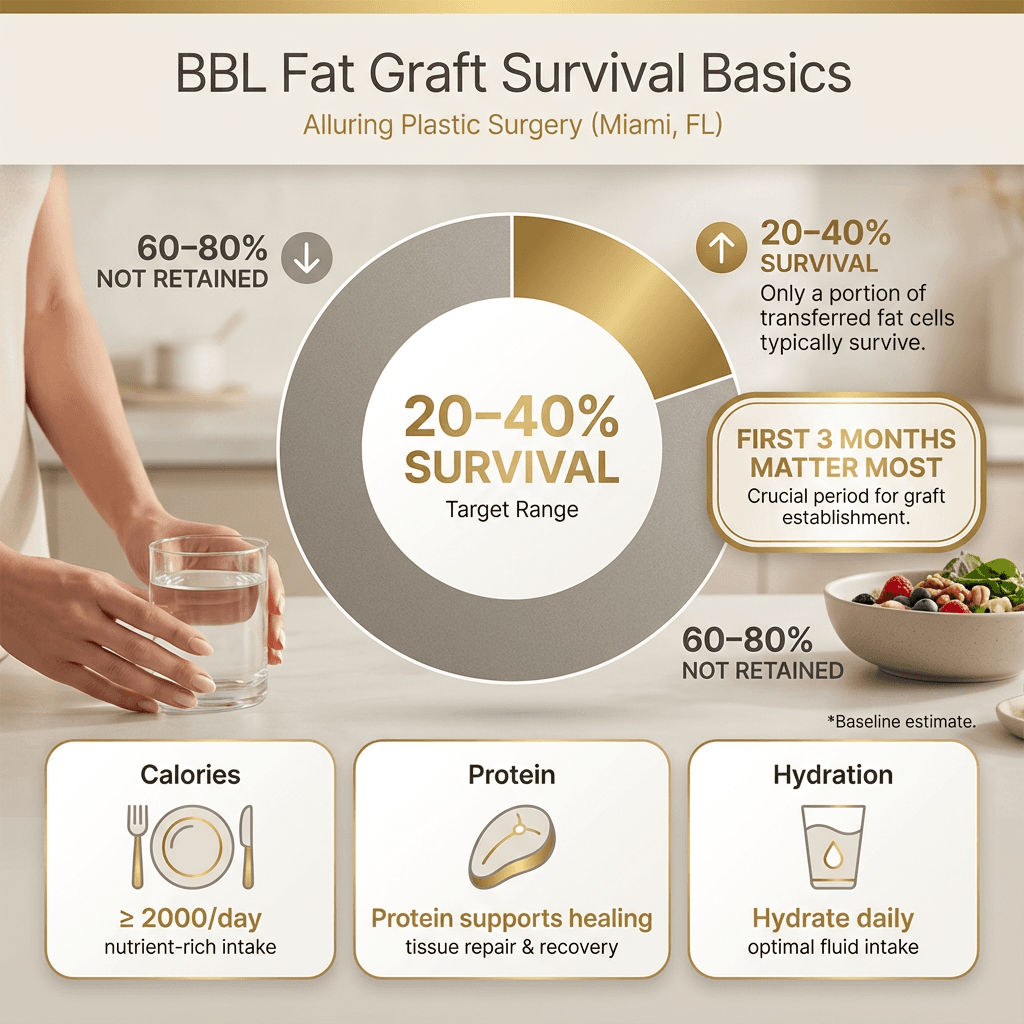
, making your post-operative nutrition vital for success. We recommend consuming at least 2000 nutrient-rich calories daily to support healing and recovery. Consult your surgeon or a post-op nutritionist to customize your intake based on your body size and healing needs.
High-protein foods like chicken, fish, and legumes provide essential building blocks for tissue repair, while healthy fats from avocados and nuts directly nourish transferred fat cells.
Fruits and vegetables deliver vitamins and minerals necessary for collagen production and immune function. Hydration is equally important; adequate fluid intake enhances circulation to newly grafted areas, improving the survival rate of fat cells.
A consistent healthy diet during the first three months post-surgery considerably impacts your long-term BBL results.
What Nutrients Help Fat Survive After a BBL?
As your body works to integrate transplanted fat cells, specific nutrients play significant roles in determining
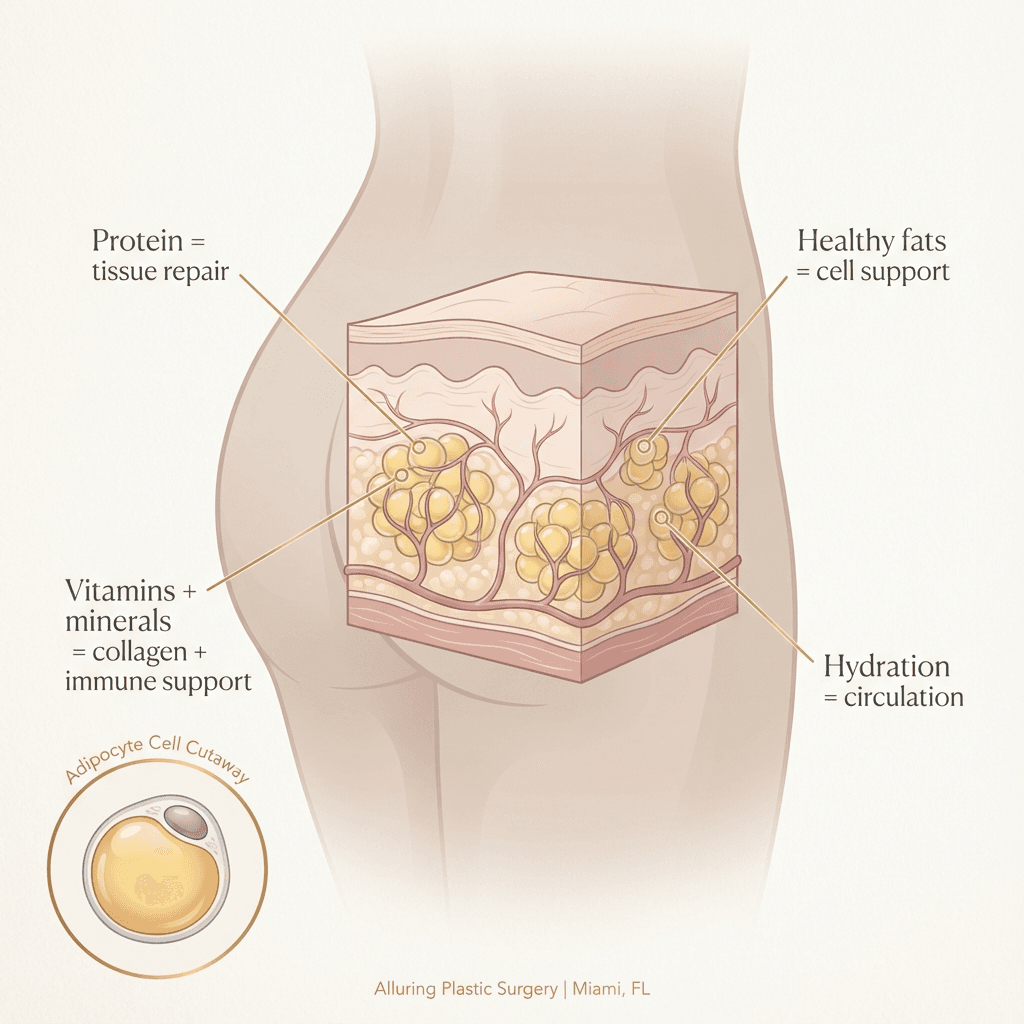
graft survival rates and overall aesthetic outcomes.
We recommend prioritizing protein intake from chicken, fish, tofu, and legumes to support tissue repair during the recovery period. Healthy fats from avocados, nuts, and olive oil provide important building blocks for transferred fat viability.
Don't underestimate the importance of fruits and vegetables rich in vitamins C, A, and zinc, which enhance collagen production and immune function—both essential for healing processes.
Maintaining a balanced diet with adequate caloric intake (at least 2000 calories daily) helps preserve the transferred fat and promotes the best results.
This nutritional approach minimizes inflammation while supporting the essential nutrients needed for successful fat graft integration.
Why Is Hydration Crucial After a BBL?
In addition to proper nutrition, hydration plays a fundamental role in maximizing your BBL results and supporting recovery. Proper fluid intake ensures tissue hydration and efficient circulation, helping deliver essential nutrients and oxygen to grafted fat cells.
Aim to drink plenty of water throughout your recovery, while limiting caffeinated and sugary beverages that can lead to dehydration. You can monitor your hydration status by checking your urine color—light yellow indicates you're adequately hydrated
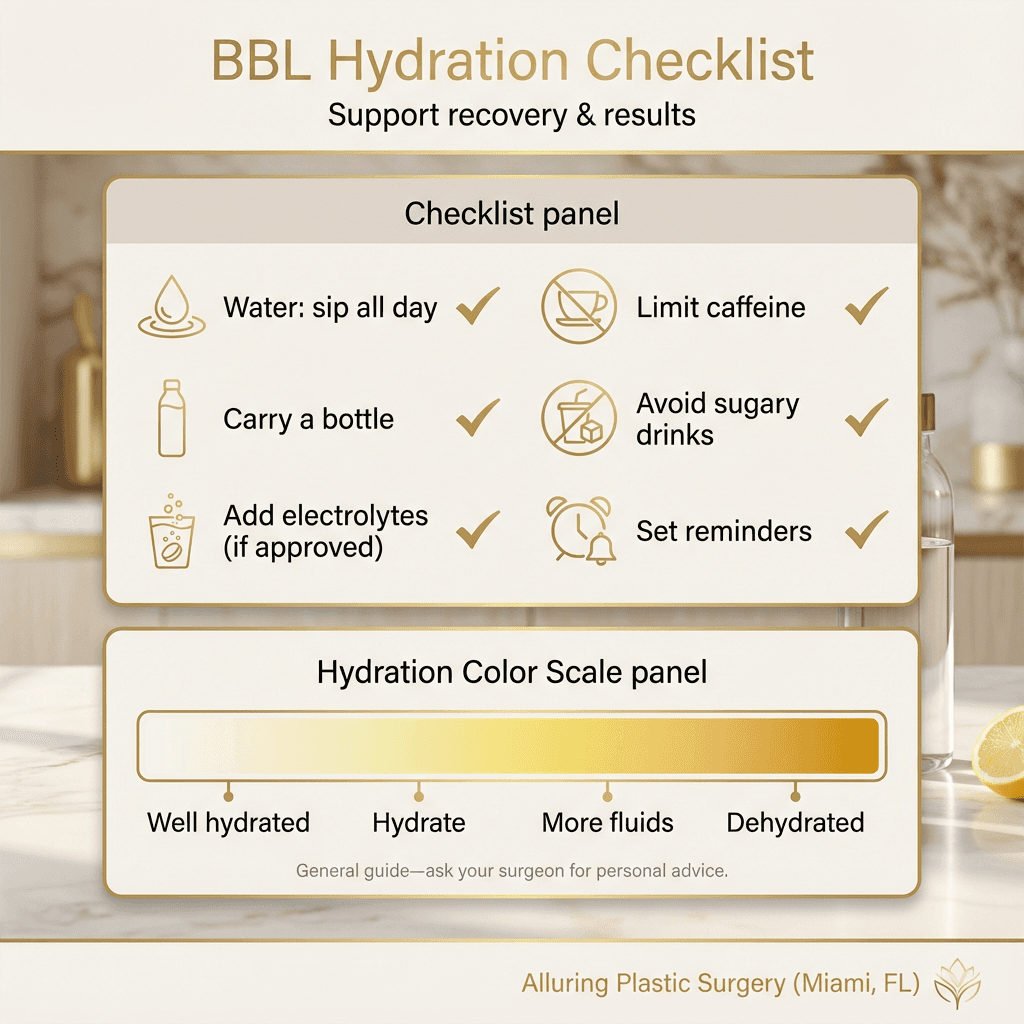
.
Proper hydration greatly reduces inflammation and swelling, creating a favorable environment for the healing process. Remember, dehydration can compromise the survival of transferred fat cells and impede recovery.
How Can Meal Planning Improve BBL Results?
Now that you know what to eat, here’s how to build a plan that supports consistent nutrient intake throughout recovery.
Strategic meal planning is essential to successful BBL recovery, helping you supply your body with critical nutrients that support fat graft survival and overall healing.
We recommend preparing balanced meals that deliver at least 2000 calories daily during initial recovery, focusing on high-fat foods like avocados, nuts, and fatty fish that enhance fat graft survival.
Meal prepping nutrient-dense options in advance guarantees you'll maintain proper nutrition even when energy levels fluctuate. Consider eating smaller, more frequent meals to help maintain steady nutrient intake, especially if your appetite fluctuates during recovery.
Include foods rich in vitamins and minerals. Focus on vitamin C, zinc, and collagen-boosting nutrients to support tissue repair. The recovery process demands consistent nutritional support, so create a structured meal plan that incorporates healthy fats, lean proteins, and colorful produce to maximize your BBL results.
Which Foods Should You Avoid After a BBL?
After outlining what to eat, it’s just as important to know what to avoid to protect your BBL outcome.
While proper nutrition supports your BBL results, certain foods can undermine your recovery and compromise fat graft survival. We recommend eliminating several items from your diet during this critical healing process.
Avoid processed meats, which trigger inflammation and impede tissue repair at the surgical sites. Similarly, sugary snacks and refined grains like white bread can exacerbate inflammatory responses, potentially reducing fat retention rates.
Fast food and fried items contain unhealthy fats that may interfere with the integration of transferred adipose tissue. Alcohol consumption is particularly detrimental during recovery, as it impairs microcirculation necessary for graft survival and can dehydrate healing tissues.
Learn More About BBL Surgery in Miami
At Alluring Plastic Surgery in Miami, our board-certified surgeons specialize in creating natural-looking, enhanced curves through expertly performed Brazilian Butt Lift procedures. Our Miami team combines artistic vision with technical precision to deliver BBL results that not only transform your silhouette but also restore your confidence and self-image.
Patients choose our Miami facility for its reputation for safety, exceptional outcomes, and comprehensive aftercare support that ensures optimal fat survival and long-lasting results.
Ready to transform your figure with a BBL? For a personalized consultation, contact Alluring Plastic Surgery today at (786) 305-8649 or fill out our online contact form to schedule your consultation.
Start Your Journey Today
Leave your name and phone number. We'll call you within 24 hours to discuss your goals.
Or call us directly
+1 (786) 305-8649Related Articles
Continue reading with these related posts
How Long After BBL Can I Sit?
Recovery after a Brazilian Butt Lift BBL requires special care when it comes to sitting. You’ve just invested in your...
What Is a Double BBL?
Many patients seeking enhanced results consider a double BBL as their path to achieving their desired aesthetic goals. A double BBL refers to a secondary Brazilian Butt...
When Can I Wear Jeans After BBL?
After a Brazilian Butt Lift BBL procedure, many patients eagerly ask: When Can I Wear Jeans After BBL? Returning to...
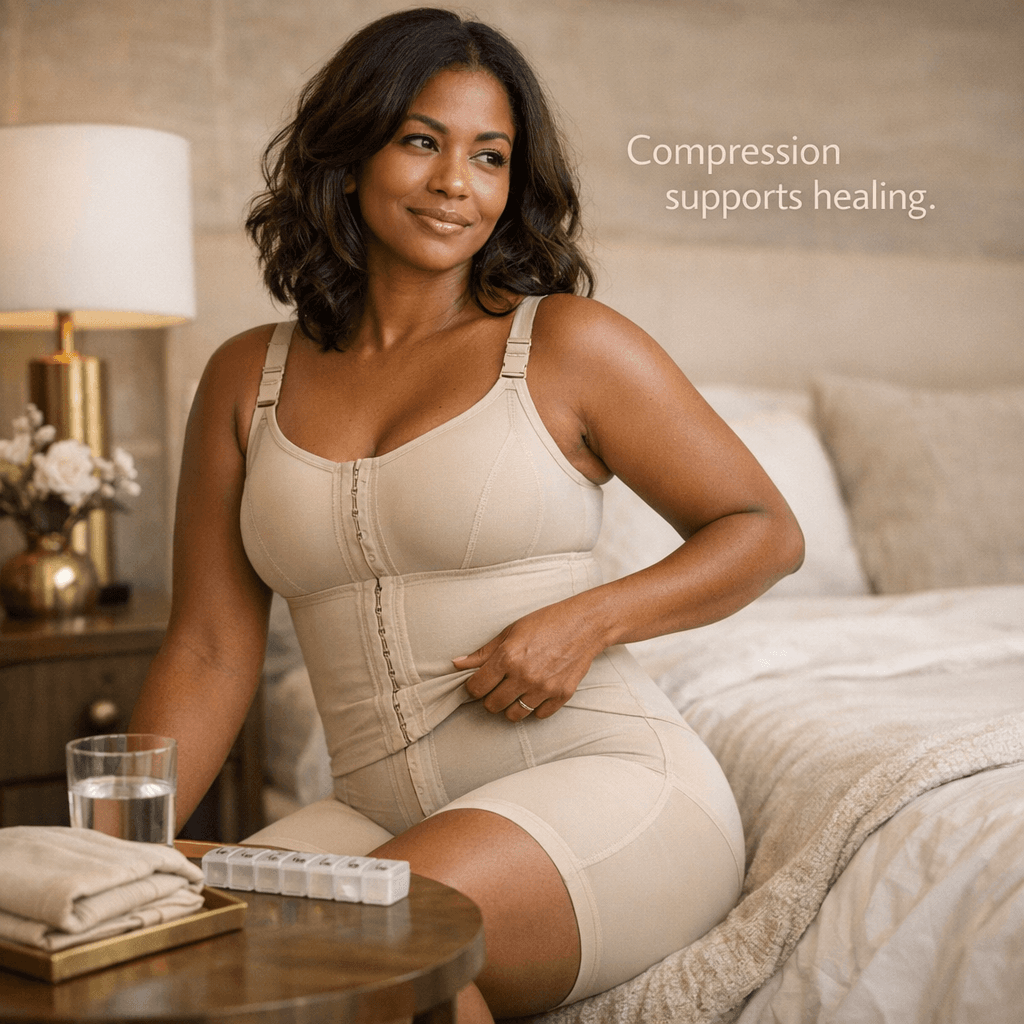
What Is More Painful BBL or Tummy Tuck?
Considering a body contouring procedure but unsure how painful recovery might be? Many patients are surprised to learn that Tummy...
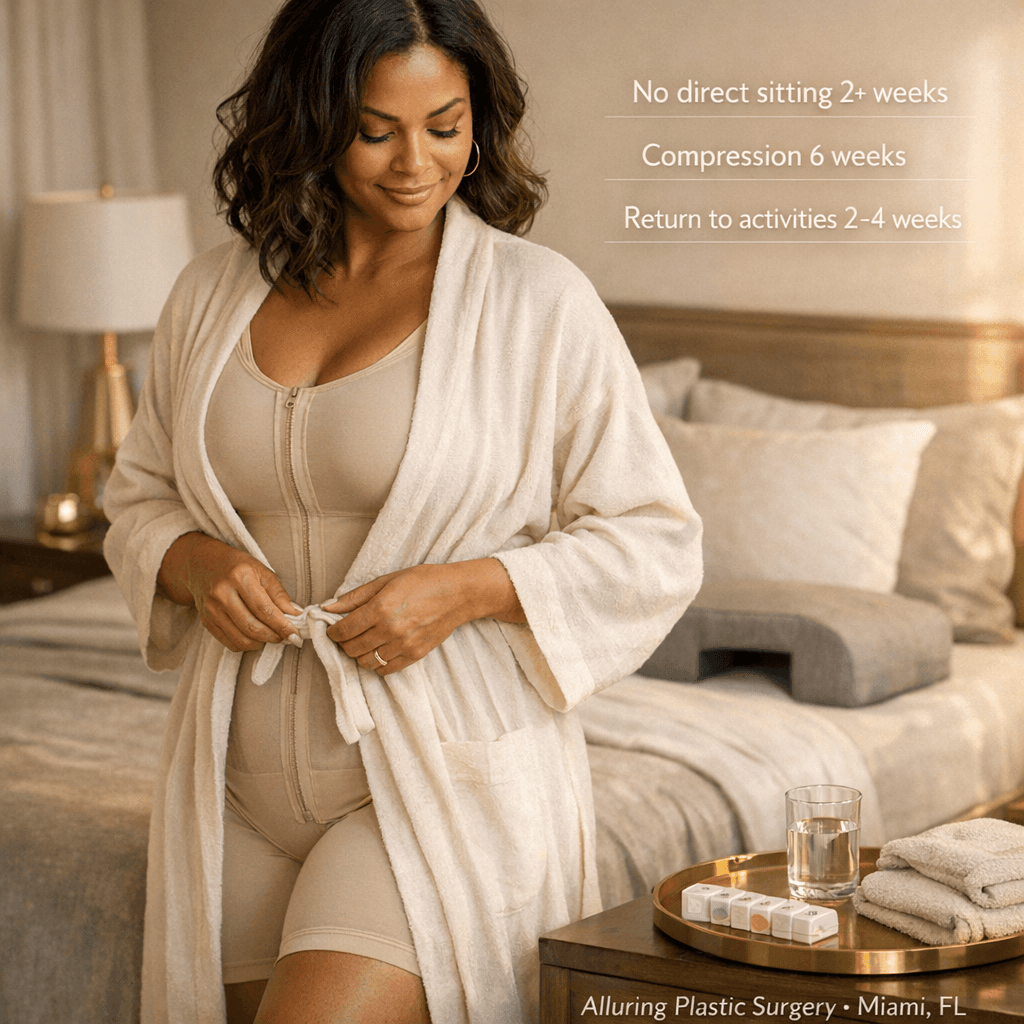
How to Fix Dents After BBL?
After undergoing a Brazilian Butt Lift BBL, some patients may notice dents or irregularities in the treatment area—an...
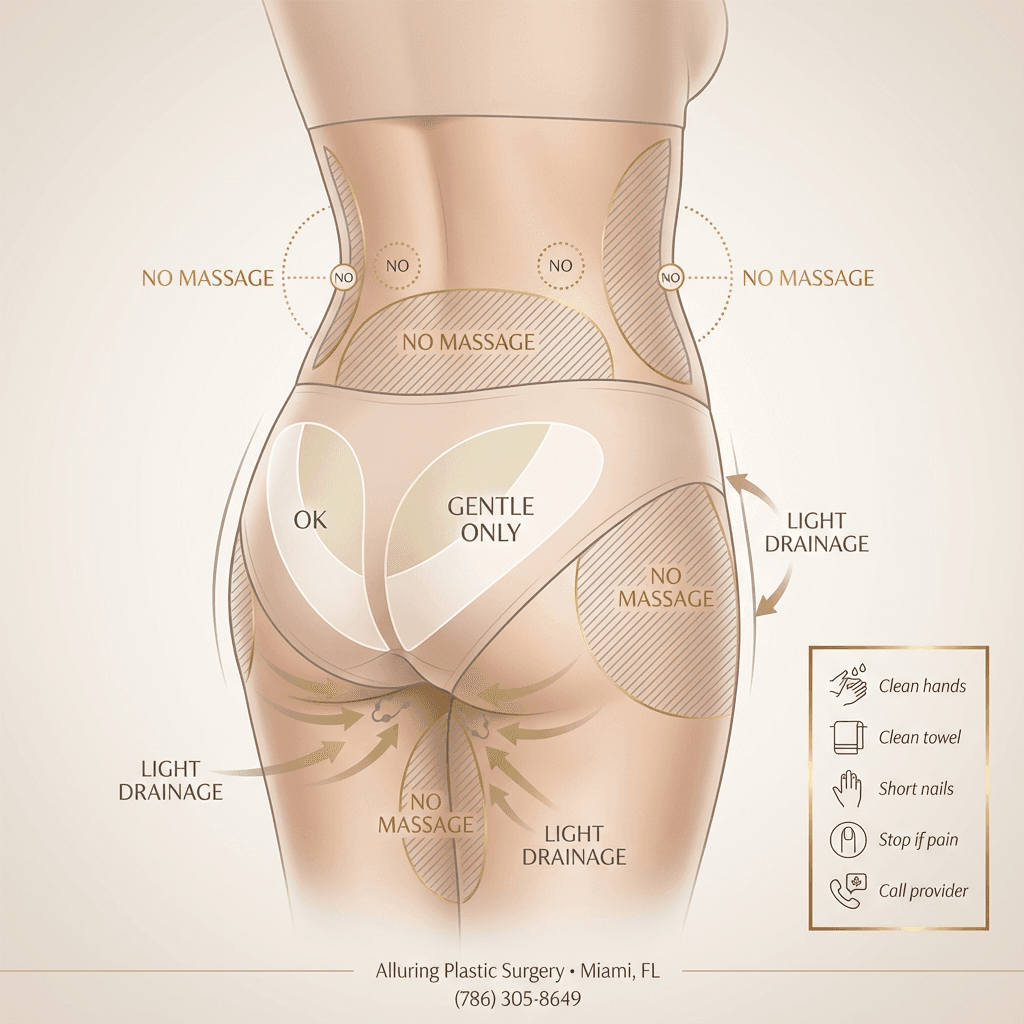
How Many Massages After BBL?
Many patients underestimate the importance of post-operative care following a Brazilian Butt Lift BBL. Skipping crucial...
Related Procedures
Explore the procedures discussed in this article

Brazilian Butt Lift (BBL) Miami
Sculpt your curves with precision. Our BBL procedure enhances the natural shape of your body by redistributing fat for a fuller, more lifted look.

Liposuction Miami
Eliminate stubborn fat pockets to reveal a more sculpted, defined body shape with advanced liposuction techniques that deliver natural-looking results.
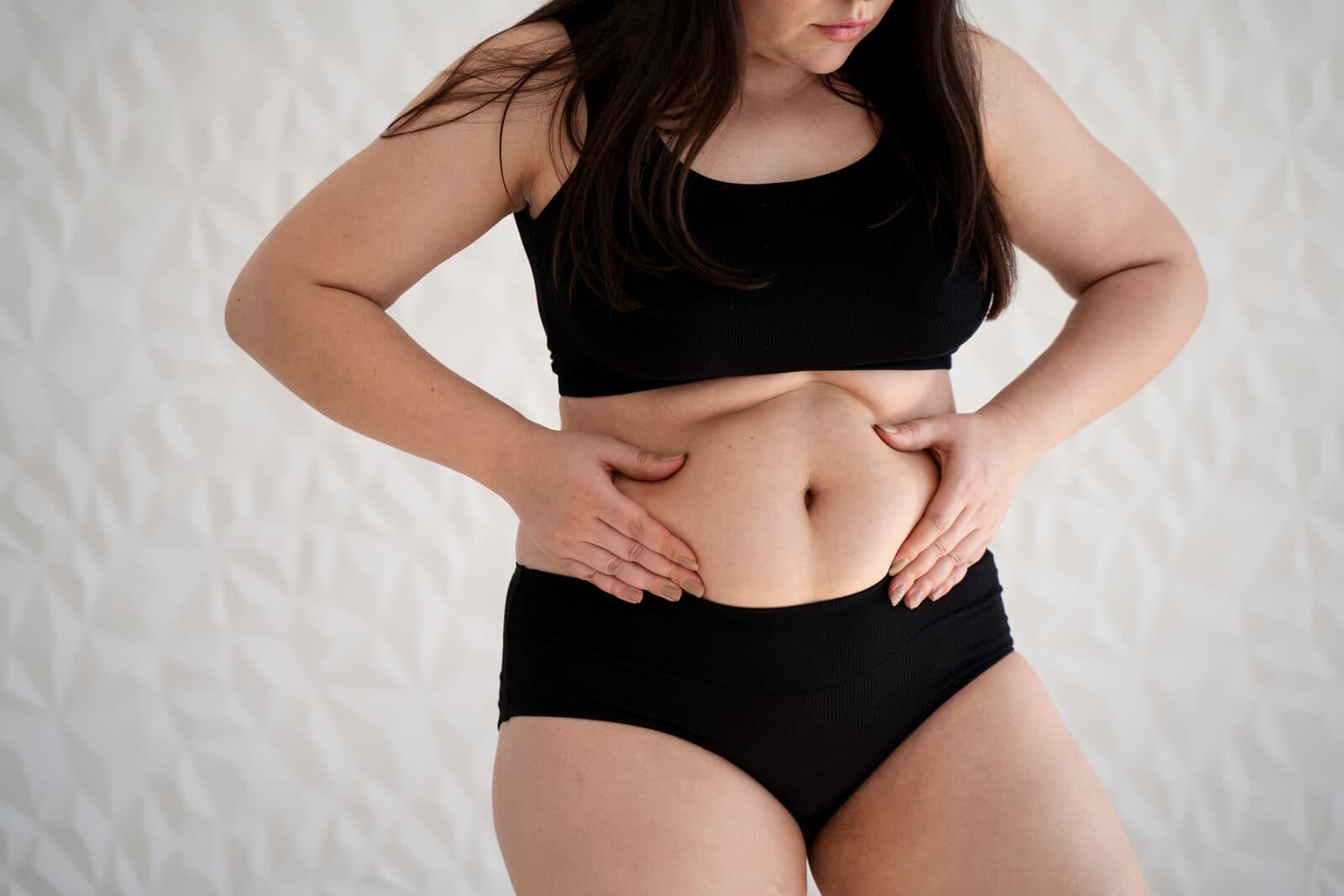
Tummy Tuck Miami
Remove excess skin and tighten your abdomen for a flatter, more toned midsection. Perfect for post-pregnancy recovery or after significant weight loss.
More BBL Articles

BBL Recovery Tips Miami: Ultimate Week-by-Week Guide
Master BBL recovery tips in Miami: ultimate week-by-week guide to pain management, compression garments, safe exercises after BBL, recovery foods & spotting complications for optimal results.

BBL Myths Busted: Safe Miami Curves for Moms
Bust BBL myths holding back Miami moms: Safe curves with <1% complications, 2-week recovery, lasting results. Discover truths, Miami recovery tips, and expert advice. Consult today!

BBL Recovery Time Miami: Moms Back to Beach in 6 Weeks
Discover BBL recovery time in Miami for busy moms. Week-by-week guide: swelling management, scar care, humidity hacks. Beach-ready in 6 weeks—download free PDF!
